- Home
- Mike Lupica
Team Players Page 2
Team Players Read online
Page 2
One day she’d come home from school, nearly in tears, and said to her mom, “Why can’t I fix this?”
And her mom had said, “Because this isn’t something you or anybody else can fix. It’s who Peter is. And he doesn’t think he needs fixing. His normal just happens to be different from yours.”
Cassie’s dad told her now that Sarah had only played basketball before this, starting with a Special Olympics Unified Sports team, on which some of the players were mentally challenged and some weren’t. According to Cassie’s dad, it was Sarah’s being on that team originally, back in the sixth grade, and turning out to be as gifted an athlete as she was, that had helped her coaches realize that she had far more social skills than they’d originally thought.
“By last year,” Chris Bennett said, “she was the star of a team that went all the way to the Special Olympics World Games. And she’d gotten so good at basketball, she was the one partnering with more challenged kids, the way she’d been partnered herself when she’d started playing ball.”
“But that means she had to talk to them,” Cassie said. “You saw what happened tonight when I tried to talk to her. It was like I’d chased her away.”
“Her parents say it takes time for her to feel safe when she gets thrown into a new situation,” her dad said. “Now she’s living in a new town, meeting new people, playing a new sport. It’s going to take time, and a lot of effort, mostly on our part.”
It turned out that there were no softball teams in Special Olympics for girls her age. But her dad, just from playing in the yard with her, and then taking her to a local field, had come to see how much she loved softball, and how good she might be at it.
“Really good,” Cassie said. “Mad good.”
Their seventh-grade team, the Orioles, also coached by Cassie’s dad, had gone undefeated and had won every tournament in the state that a girls’ softball team could win. And they all knew that this summer the stakes were even higher for them. If they could win their All-Star League, they qualified for a New England tournament that would be shown on NESN, the Red Sox television network, with the championship game at Fenway Park on a weekend in August when the Red Sox were on the road. It wasn’t the Little League World Series. But it would do.
The teams that were good enough would get their chance to play at Fenway, and get their chance to play on television. Yeah, that kind of spotlight would do, all of them getting their chance to shine. It was the biggest reason why Walton Baseball had asked Cassie’s dad to come back and coach one more season, even though he’d sworn he was retiring last year.
Cassie’s dad told her he’d been reading up on Asperger’s since Sarah’s mom and dad had called and asked to meet with him. Not only did her parents want Sarah to play softball, but they planned on enrolling her at Walton Middle in the fall.
“I’m not trying to give you the same crash course on Asperger’s I’m giving myself,” Cassie’s dad said. “But the thing that can be most difficult for these kids is what we think of as normal social interaction.”
“Like just complimenting her on a good play in the outfield,” she said.
“Like that.”
He said it wasn’t going to be the last time that Sarah might panic and run away, and she might not even stop at the bench next time. Or she might lose her temper, because her parents said she could fly off the handle, sometimes for reasons that only she understood. Or she could get fixed on routines, like standing in the same spot in the outfield.
“She didn’t make much eye contact tonight, Dad.”
“And she might not. And there might be things that make no sense to you. Her parents said that even though loud noises bother her, she can get loud sometimes.”
“Sounds like a process,” Cassie said.
“And a challenge for you,” her dad said. “But who’s more up for challenges than you are?”
“You got me there,” she said, and bumped him some fist.
“Listen,” he said, “this whole thing is gonna be a work in progress, for me included. For all of us. But I’m gonna need your help to make it work.”
“Just tell me how.”
“With some of the other girls,” he said. “The ones who, let’s face it, aren’t always as aware about stuff as you are. I mean, I know a lot of people think you’re stuck on yourself—”
“Hey,” Cassie said. “I thought we were bonding here.”
He laughed. “But I know better, because I know my daughter. And her heart. It’s why I know you can take the lead on this.”
“Sounds like you’re setting the bar kind of high for me, Dad.”
He smiled. It was the kind of smile that had always felt to Cassie like his arms around her. “Almost as high as you set it for yourself.”
They sat in silence for a moment, the only sound in the room the ticking of their antique grandfather clock, actually given to them by Cassie’s grandfather.
“I promise this will be worth it,” her dad said.
Then he added, “Win or lose.”
Cassie felt herself smiling. “I know,” she said. “So she’s going to make the team, then?”
Chris Bennett laughed again, even louder than before.
“She made it when she caught that ball,” he said.
• • •
When they were finished, Cassie went upstairs and got out her laptop and read up on Asperger’s syndrome herself, starting with the Autism Speaks website. She was trying to understand about the autism spectrum, telling herself to think of it as a scale and not a spectrum. But what was pretty clear to her was some of the behavior you could expect from somebody with Asperger’s, some of the awkward mannerisms, some of the things her dad had mentioned and some he hadn’t.
There was one thing that jumped out at her and actually made her smile, though she knew none of this was funny:
“One-sided conversations.”
When she called Jack and told him about that one, he said, “One-sided conversations? That sounds like half the kids we know. Heck, probably more than half.”
Cassie said, “There was also this thing about kids with Asperger’s sometimes being obsessed with unusual topics.”
Jack said, “That sounds like your whole team.”
“But honestly?” she said. “This is no joke. Kathleen and Nell? You know what they’re really obsessed with? Being good enough this season to get on television. No lie, Jack. They think that if they can do that, they’ll be halfway to being Kardashians.”
Jack wanted to know more about Sarah, what she’d been like at practice. Cassie told him about her standing in one place, and no eye contact, and running away when Cassie had tried to talk to her. But then Cassie told him about the catch she’d made, and how she’d turned and thrown the ball back in, even though she’d never played in a real softball game in her life, like she just instinctively knew that was the right thing to do. And then Cassie told him about what Sarah had been like when it was her turn to bat, how nervous she’d looked at the start, as if she’d known that everybody was watching her, how she’d swung and missed badly on the first few pitches Cassie’s dad had thrown to her.
After that, though, she’d proceeded to hit a line drive over third base, another one over first, hit a ball off the wall in right-center, and nearly took Chris Bennett’s head off with a shot right back up the middle.
“So she can really play?” Jack said.
“Yeah,” Cassie said.
“Did she pitch?”
“Oh yeah,” Cassie said.
“As fast as you?”
Cassie said, “I’m not going to dignify that with a response.”
“I don’t know what I was thinking,” Jack said.
Then he said, “If she’s as good as you say she is, then it should be no problem with the other girls, because she’ll just make your team better, right?”
“I just want everybody on the team to be nice to her.”
“Because she’s a good player, or because she’s
a good person?” Jack said.
Cassie paused, because it was such a good question.
“Hopefully both,” she said.
“Listen, Cass,” Jack said, “it’s going to be like everything else. They’ll take their lead from you, like they do on the field. Because they know they have no chance to make it near Fenway without you.”
“You’re probably right.”
“I’m calling Teddy and Gus and telling them you told me I was right about something.”
“I said ‘probably.’ ”
“You’re probably overthinking this,” he said.
“Okay, what do you think about this—or overthink—is it going to work out?”
“Honestly? I have no clue. And no matter what you do, and how easy you try to make things for her, you can only play your own game. You can’t play hers.”
“Who says?” Cassie Bennett said.
FIVE
Sarah made the team.
All of the girls from last year’s team made it too, at least the ones who still lived in Walton. Two had moved away. But the best players were still around, Brooke behind the plate, Lizzie at third base, Allie at second, same as when they’d gone undefeated. Nell was still in right field, Kathleen in left. Greta Zahn had played center last season and had thought she was going to play center this season. But Cassie was sure that was going to change now that Sarah Milligan was on the team, which was going to be called the Red Sox. Sarah was a better fielder than Greta, a better batter. A better everything.
When they had their first practice after the team was set, the Tuesday after tryouts and four days before the season would officially begin, Sarah still didn’t seem to be more comfortable with her new teammates. It didn’t stop her, though, from making another spectacular catch during batting practice, this one on a ball that Brooke had hit, Sarah coming in on a sinking line drive and making a sliding, backhand play.
“She’s like a one-girl highlight film,” Cassie said to Greta.
They were both waiting to hit.
“Anybody can make plays in practice,” Greta said.
Greta was tall and blond. She was fast and had surprising power for someone as skinny as she was. But just from one tryout and the start of practice tonight, anybody could see she wasn’t the ballplayer that Sarah Milligan was, whether this was Sarah’s first time on a team or not.
“I have this feeling,” Cassie said to Greta, “that she’s going to be one of those players who does what my dad says we’re supposed to do: practices like she plays.”
“It sounds like you’re cool with her creepiness,” Greta said.
Cassie turned to her, leaning on her bat.
“Gonna give you a heads-up, Zahn,” Cassie said, smiling but not meaning it. “I wouldn’t let our coach—my dad—hear you calling Sarah creepy.”
“Would you feel better if I called her weird?”
“Not so much.”
“So you’re telling me you don’t think it’s going to be weird having her around?”
Cassie had always managed to get along with Greta, who was probably the smartest kid, boy or girl, in their grade at Walton Middle. But having known her since kindergarten, Cassie also knew that Greta was never going to get an A in being kind.
Cassie gave Greta her biggest smile now and said, “We’ve only known her for two days. What I think would be weird is not giving her a chance to fit in.”
And she walked up to the plate to get her swings.
Even though they’d only spent two days around Sarah, they all could see by now how much she liked routine. Really liked routine. It wasn’t just that she was always in the same spot in the outfield. When Sarah did speak to Cassie’s dad, she wanted to know what the batting order was for batting practice, exactly when she’d be hitting, who was going before her and who was going afterward. She always placed her bat bag in the exact same spot where she’d left it during tryouts, underneath their bench, at the end closest to home plate.
When they’d watched her place it there tonight, Kathleen had said, “She’s like a softball neat freak.”
“Wade Boggs, who used to play for the real Red Sox, ate chicken at the same time before every game,” Cassie said. “And he’s in the Baseball Hall of Fame.”
This was before they’d all taken the field. Sarah had been sitting at the end of the bench, by herself, where the bat bag was.
“Look at her,” Kathleen said, at least keeping her voice low. “It’s like she’s on the team and not on the team at the same time.”
“C’mon, Kath,” Cassie said. “You’ve seen her play. You don’t think she’s gonna help us?”
“I didn’t know we needed help.”
“You can always get better,” Cassie said. “Do you know who Kevin Durant is?”
“No.”
“Never mind,” Cassie said.
“I just don’t want anything to get in our way this season,” Kathleen said. “Or anybody.”
“Maybe we should all just concentrate on staying out of our own way,” Cassie said. “And remembering that being on this team is supposed to be fun.”
Kathleen nodded at Sarah. “Does she look as if she’s having any?” she said.
They did some baserunning drills after everybody had gotten their swings during batting practice. Cassie’s dad would put runners on first and second, or first and third. Sometimes he would load the bases. Then he’d tell them how many outs there were, maybe even make up a game score and an inning, before he’d hit a ball to one of the outfielders. Sometimes it would be a base hit, sometimes a fly ball. Sometimes one of them would try to score from third on a fly ball, or just take an extra base. It went like that. He kept rotating the outfielders. But by now everybody had figured out that if the ball was hit to Sarah, it was a losing play to try to run on her arm.
One time Cassie was on second base and Chris Bennett hit a hard single to Sarah in center. Her dad had announced that there were two outs, so Cassie was running as soon as he hit the ball. As she came around third, she was able to pick up Sarah’s throw to the plate with her eyes, saw it tracking toward Brooke behind the plate. As fast as Cassie was, she wasn’t fast enough to outrun a throw that ended up in Brooke’s mitt on the fly.
Cassie was out by ten feet.
She’s a freak, Cassie thought.
In a good way. A sports way.
Kathleen had scored from third ahead of Cassie on the play, and was standing next to the plate when Brooke easily tagged out Cassie.
Cassie shook her head and said to Kathleen, “She might not look as if she’s having any fun out there. But I’ll bet it’s fun to throw a ball like that.”
Kathleen just stared at her. “What is she, your new best friend?”
“Just a new teammate,” Cassie said, before she went to get her glove and run out to shortstop.
“Not the same thing,” Kathleen called after her.
Cassie ran right past her and said, “To me, it is.”
• • •
Because the season was starting on Saturday, Cassie’s dad had scheduled practices for the next two nights. Jack and Teddy and Gus were coming to Highland Park on Thursday night. When practice was over, around seven o’clock, they all planned to walk into town and have pizza at Fierro’s.
Cassie had told them she could just meet them, but Jack had said, “We want to see NG.”
New Girl. Sarah.
“What about me?” Cassie said.
“Of course we always want to watch you,” Jack said.
“Just remember that means watch, and not make observations I can hear,” she said.
They had finished playing two-on-two basketball at the hoop in Cassie’s driveway and were now in the car with Cassie’s mom on their way to the field. Baseball All-Stars for the guys didn’t start for another week, and Jack and Teddy and Gus had worked out a little at Walton Middle in the morning, something they loved doing now that school was out. But they said that if they didn’t have some real competiti
on, they were going to go crazy. So it had been Jack and Cassie today against the other two, with Jack and Cassie crushing them.
Teddy said, “But if we make amusing observations you can’t hear, that doesn’t count against us, right?”
Cassie said, “I’ll know you’re making them.”
“But you won’t know exactly what we’re saying,” Gus said.
Mrs. Bennett said, “I wouldn’t be so sure of that.”
Jack said, “We know what you can do, Cass. We do want to see the new girl.”
“Is she fitting in any better?” Gus asked.
“Not even a little bit,” Cassie said.
“What does she do?” Teddy asked.
“Hits and runs and catches and throws,” Cassie said. “Then one of her parents or both of her parents pick her up and she goes home.”
There was a time, back when Cassie first started playing team sports, when practice felt like homework to her. Like a chore. But not anymore. There had been a night last season when her dad had pulled her aside after practice, when it had been clear to everybody, starting with her dad, that she had just been going through the motions. She’d been goofing around on the field, even batting left-handed when it was her last turn to hit, showing off for her teammates, nearly hitting a home run.
Before they’d even gotten into the car, Chris Bennett had walked her down the right-field line, away from the rest of the Orioles, and said, “What were you doing out there tonight?”
“Having fun.”
“You’re the best player on this team, and you know it,” he said. “If you don’t take this stuff seriously, none of your teammates will either.”
“I’m always serious once the game starts,” she said, knowing how defensive she sounded.
“I want you to be serious when I’m trying to teach the team how to play this game the right way,” he said. “So I can’t have you going the wrong way. Somebody told me once that when your best player does things the right way, it filters down through every other player on the team.”

 Fool's Paradise
Fool's Paradise Batting Order
Batting Order Stone's Throw
Stone's Throw The Lacrosse Mix-Up
The Lacrosse Mix-Up The Hockey Rink Hunt
The Hockey Rink Hunt Payback
Payback Triple Threat
Triple Threat Defending Champ
Defending Champ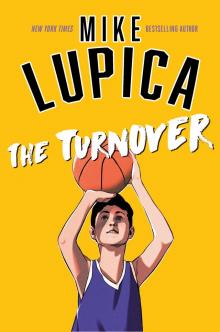 The Turnover
The Turnover Robert B. Parker's Blood Feud
Robert B. Parker's Blood Feud Strike Zone
Strike Zone Hero
Hero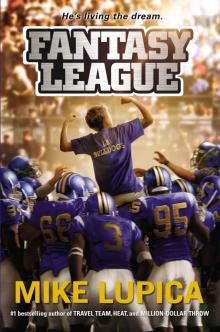 Fantasy League
Fantasy League Robert B. Parker's Stone's Throw
Robert B. Parker's Stone's Throw The Big Field
The Big Field Jump
Jump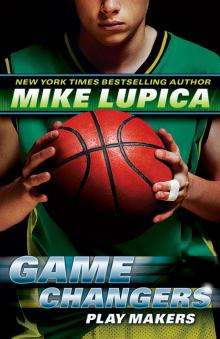 Play Makers
Play Makers The Underdogs
The Underdogs Team Players
Team Players The Half-Court Hero
The Half-Court Hero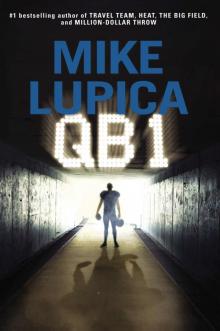 QB 1
QB 1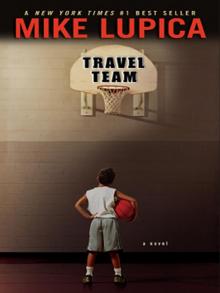 Travel Team
Travel Team The Only Game
The Only Game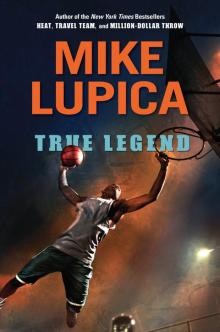 True Legend
True Legend The Batboy
The Batboy Hot Hand
Hot Hand Million-Dollar Throw
Million-Dollar Throw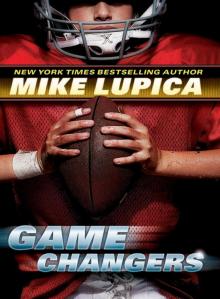 Game Changers
Game Changers Miracle on 49th Street
Miracle on 49th Street Two-Minute Drill
Two-Minute Drill Fast Break
Fast Break The Football Fiasco
The Football Fiasco The Missing Baseball
The Missing Baseball No Slam Dunk
No Slam Dunk Heavy Hitters
Heavy Hitters Summer Ball
Summer Ball The Extra Yard
The Extra Yard Last Man Out
Last Man Out